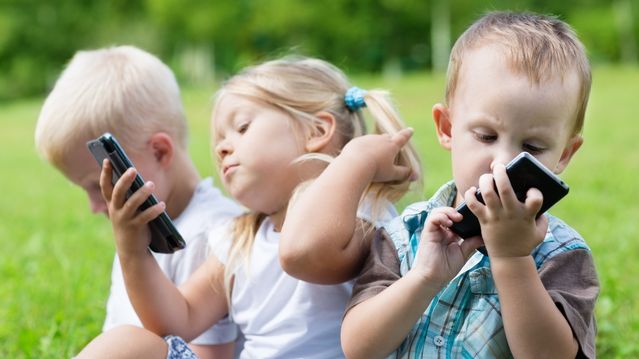
Parenting
Smartphones vs. "Smart Parenting" Part One
The dangers of digital babysitters.
Posted July 1, 2016

Recently I saw a television commercial that both intrigued and horrified me. It showed the close-up faces of concerned parents lamenting the fact that their toddlers were spending countless hours zoned out and exposed to inappropriate imagery on iPads and smartphones. And more importantly, they felt powerless to do anything about it! They described what amounted to “withdrawal symptoms” of angry tantrums, tears, and meltdowns when attempts were made to either limit or cut off access to these electronic babysitters. What I felt puzzled by was the apparent helplessness of these parents who seemed genuinely overwhelmed by the problem and completely in the dark about what to do.
Why do babies and toddlers have digital gadgets in their hands in the first place? I understand there is a temptation to “distract” an antsy toddler with a game on a smartphone or iPad. But parents need to understand that young children are intrinsically antsy. They have short attention spans. It’s unreasonable and unrealistic to expect a small child to sit still for long periods of time. In fact, they need to be able to explore the world through physical activity and movement. And they require connection, attachment, and emotionally available and responsive relationships to help them navigate abrupt shifts in mood and experiences of stimulation overload. The use of digital gadgets is sedentary and solitary: the antithesis of what small children need to developmentally thrive.
Common Sense Media says 38% of babies less than two years old use tablets or smartphones. That number is up from 10% in 2011. The American Academy of Pediatrics has repeatedly stated that children under two should not engage in any screen time. Yet several studies indicate that 70% of parents allow their toddlers to use their iPads. Researchers at Barnard College found that preschool children were so “zoned in” with iPads that they didn’t respond at all when repeatedly called by name. However, once the iPads were taken away the toddlers became more verbal and social and were able to interact more creatively with their environment. Further studies showed that when parents used their devices as distractions to calm upset children, those children were less likely to learn how to calm themselves and control their own behavior.
There is something fundamentally wrong with an 18-month-old whose greatest source of comfort is their parent’s smartphone.
Additional studies tell us that children who spend much of their early childhoods interacting with electronic devices may have less thinking ability, smaller vocabularies, and poorer social and emotional skills than children who don’t. Did you know that in a typical day kids spend twice as much time watching TV and DVD’s than they do reading or being read to?
I believe it's not about distracting kids, it's about engaging them! I also believe that well meaning and loving parents have the potential to create what amounts to an addiction in small children who cannot tolerate having gadgets taken away and only feel comforted and soothed when they are dissociating into virtual reality. Because I understand that technology is here to stay, in Part 2 of this series, we’ll look at some of the ways that parents can take back control. But I'd still like to go on record as saying there is something fundamentally wrong with an 18-month-old whose greatest source of comfort is their parent’s smartphone.

